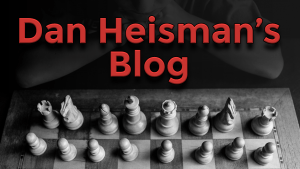Q&A with Coach Heisman Dec 13, 2013
"I know doing basic tactics puzzles is good for me but I don't have much fun doing them. How can I make them more fun?"
A great question. But of course the answer depends on a large part of what is preventing that study from being fun. It might be something easily fixed or it could be something impossible to improve. As a start I suggest reading Chess, Learning, and Fun.
Let's make some suggestions that can make studying basic tactics more fun for those who might find it otherwise tedious:
- Choose your best media. For example, using the Tactics Trainer or Chess Mentor here at Chess.com might be better for you than using a great book such as Bain's Chess Tactics for Students or my Back to Basics: Tactics only because you might enjoy the bells and whistles of the software.
- Adding - or removing! - timing of the puzzles might make it more enjoyable. If you currently feel time pressure, switch to a set that doesn't have it, or vice versa.
- Keep statistics - learn to see which positions and type of motifs (Counting, Pin, Double Attack, Removal of the Guard, Back-rank Mate, etc) you do well or not so well. Which positions and motifs do you recognize and which ones do you need to solve? Some players find keeping the statistics and studying them more fascinating than doing the problems (but of course many don't, although most software tactics servers now keep the statistics for you)
- Mix up the tactics study with other study, such as reading over lots of annotated games or maybe my Novice Nook columns on how players of all levels can improve. Stop whenever you get bored - take the following link to IM David Pruess' comments on when to stop studying tactics for the day.
"Is giving up a piece with the Lolli or Fried Liver worth it, or if you play it wrong are you just down a piece?"
The Fried Liver is 1.e4 e5 2.Nf3 Nc6 3.Bc4 Nf6 4.Ng5 d5 5.cxd5 Nxd5? 6.Nxf7 and the Lolli is 6.d4
I know many readers just consider me primarly a "beginner/intermediate" coach. However, not only have I developed many strong students, but also I'm happy to have some small contributions to chess theory. In this case (Lolli/Fried Liver) I have been part of the computer revolution on these openings. I wrote an e-book on the Fried-Liver & Lolli, and followed that up with an article published in the New in Chess Yearbook #94 Forum (2010). That article postulated that the Lolli, for many years considered by theory a superior version of the Fried Liver, was actually not as good for White as previously thought. Moreover, others such as US Correspondence Champion Jon Edwards have championed improvements in the Fried Liver. After 1.e4 e5 2.Nf3 Nc6 3.Bc4 Nf6 4.Ng5 d5 5.cxd5 Nxd5? (a common beginner mistake - better but perhaps not quite equal, is 5...Na5. Other lines 5...Nd4 or 5...b5 are likely better, too) 6.Nxf7 Kxf7 7.Qf3+ Ke6 8.Nc3 Nb4 and now both 9.O-O (Edwards) and 9.Bb3 (computers) are difficult for Black to defend. The net result is that I have reversed my opinion 180 degrees; formerly I believed the books that the Lolli was a superior version of the Fried Liver. Now I believe the Fried Liver is the line which gives White the better chances. Having said all that, yes, White still has to play carefully, of course, but no, it's a completely sound sacrifice and if your opponent plays 5...Nxd5 then 6.Nxf7 it should be.
"Is regularly playing blitz or bullet bad for your chess?"
First of all, what is "your chess"? If that means long time control chess, that may require a different answer than if blitz and bullet IS your chess! The other two key words in your question are "regularly" and "bad". Something might hinder your development (make it take longer) without actually being "bad" (reversing your development).
As for "regularly", if we substitute "exclusively" or "habitually", as if you were addicted, that would also change the answer. Anything where you are addicted is likely bad, but regular speed play can, for non-beginners, often be helpful. When I was an improving player, I regularly played 5-minute chess (5 0) and it helped, but I used it to practice my openings, practice tactics, time management, and criticality assessment (see Getting the Edge, especially items #4 and #5). If you are not looking up your openings after your speed games and instead making the same opening mistakes over and over, what's the point?
Another key question to keep in mind about speed chess's relation with slow chess: who are the best speed chess players in the world? Easy - the best slow players in the world. How did they get that way? Well, most of them (except Botvinnik, who claimed he only played one speed game ever) did play a lot of blitz, but I suggest it is learning how to play aspects of many positions from slow chess that gives you the ability to quickly recognize those issues in blitz and still make relatively good decisions. Certainly all those players got their titles from playing tons of over-the-board slow events.
The show, as usual, featured lots of questions about which openings are good. Aaaah - if you haven't read it yet, check out my Chess.com blog What's a Good Opening? and the article on my show two weeks ago where I discuss "Is it OK to play Opening X?" In today's show my answer to most was "Of course" but when someone got to the Albin Counter Gambit, that's when I hedged with "That's probably not the best opening in the world for Black" but I guess if you love it, keep playing it. Another asked "What opening do you suggest for beginners?" and I mentioned I agree with the conventional wisdom that playing open games (like 1.e4 e5) to learn tactics is wise. Delaying tactics for a few moves with an opening like the King's Indian Attack is not really going to help in the long run, IMHO.
Two viewers asked about worrying about Elo ratings (Yes, Dr. Arpad Elo's, and not the Electric Light Orchestra ELO). My usual response: Worry about your playing strength and not your rating; in the long run your rating will just follow your playing strength anyway. I also suggest that someone rated 1000, when given the choice of losing 100 straight interesting games to a 1400 (normally the player 400 points lower should score about 11% of the points) versus winning a Scholar's Mate versus a beginner 100 times, should choose the 100 losses every time. Winning 100 straight Scholar's Mate is about as interesting as flipping a coin, and you probably don't learn as much as in the coin flipping. I also have two articles on the dangers of rating fascination:
- Encouraging Tournament Participation (starting at the bottom of that link page; this article won a Chess Journalists of America award), and
- Don't Fall into The Improving Scholastic Player's Rating Trap
Later in the show, when a viewer asked if I could change one rule, what would it be, I suggested that if that could include "non-board" rules (board-rules meaning traditional "how the pieces move"), then I would "hide" the rating system, as per the article in the first bullet above.
Next show on Dec 27 is open to Diamond and Platinum members.
A great, healthy, and happy holiday season to all!






